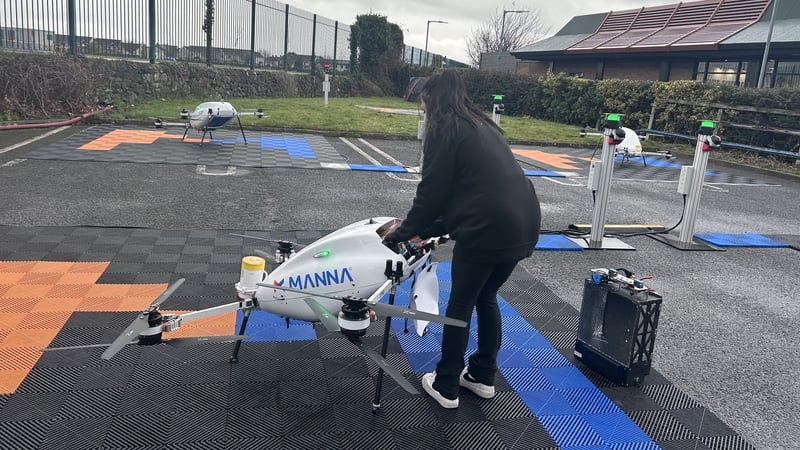Analysis: There are many issues from noise to privacy which need to be considered around fast food drone deliveries in Ireland
Back in 2020, a RTÉ report on Manna’s new drone delivery service showed two cappuccinos being delivered by one of the company’s drones in Oranmore in Co Galway. A member of the public summarises the milestone as ‘this is space age!’ Five years on, Manna is the leading company operating drone deliveries in urban areas in Ireland, with a service which appeals to those looking for a futuristic and novel way for ordering their takeaway pizza or coffee.
Other drone delivery companies are also conducting trials and operating in Ireland. This includes Wing, operated by Google’s parent company Alphabet that has conducted trials in Lusk and South Dublin and Iona, a company focused on deliveries to rural and underserved areas.
We need your consent to load this rte-player contentWe use rte-player to manage extra content that can set cookies on your device and collect data about your activity. Please review their details and accept them to load the content.Manage Preferences
From RTÉ Radio 1’s Saturday with Colm Ó Mongáin, the positives and potential negatives that come with drones
On its website, Manna promotes its drone delivery service as beneficial to local communities, with fast delivery, cleaner air and less traffic. They address complaints about issues of privacy by arguing that the drone cameras only operate when deliveries are being lowered. In terms of noise pollution, Manna refer to a report undertaken by Dr. John Kennedy, Associate Professor in Vibrations, Acoustics and Dynamics at Trinity College Dublin. This study analyses the noise of their drones using their Blanchardstown delivery service and claims its fly-over noise is just marginally above the noise found in a ‘typical urban setting with steady traffic’.
But what is the social impact of such novel technologies as they are implemented at a much faster pace than any means of adequately regulating them? Issues other than noise need to be taken into consideration when analysing this. For example, scaling up drone delivery services across cities might involve an increase in the number of drone stations similar to Manna’s Blanchardstown base, which has been subject to complaints about noise and privacy intrusion. It might see the development of larger hubs, such as the Amazon drone-beehive concept, a multi-storey tower surrounded by drone launching pads and with terminals for truck delivery at ground level.
While there are EU regulations on the operation of drones above 250 grams in weight or ones that record personal data (image or sound), there is a lack of information about drone flight pathways: for example, there is no drone equivalent to the flight tracking website Flightradar24. The only information available, thanks to recent EU regulations, is the geographical zone map for the usage of drones across Ireland.

Safety concerns about the social impact of drones have been well documented. An academic paper from 2016 records concerns including navigation and piloting mistakes, crashes into public infrastructure (such as electricity poles), roads or private property, hijacking of their GPS systems, and the possibility of the payload becoming unattached during flight. It also points out that both the freedom from harm and the freedom from fear of harm are basic human rights.
It’s no surprise that local Irish communities are starting to mobilise around this issue and taking the matter into their own hands considering the lack of adequate discussion and consultation on the use of drone delivery services. Manna’s plans to operate drones from other areas in Dublin, such as Dundrum and Glasnevin, have already ran into objections and opposition.
Dún Laoghaire Rathdown Co Council said they have received 148 submissions over Manna’s proposal to locate a new aerial delivery hub on lands to the rear of the Holy Cross Church in Dundrum. Writing on behalf of the Holy Cross Church and Pastoral Centre, Monsignor Paul Callan said their objection was on the basis of the drones potentially crating a “hostile noise environment” against the Centre’s aim to offer “a quiet respite to the demands of modern life”.
We need your consent to load this rte-player contentWe use rte-player to manage extra content that can set cookies on your device and collect data about your activity. Please review their details and accept them to load the content.Manage Preferences
From RTÉ Radio 1’s Liveline, listeners call in to give out yards about drones
Manna’s counterargument is that they have support from local residents in the areas where they operate and they have submitted a letter in support of their drones to Dublin 15 local representatives signed by 400 local residents. But Cllr John Walsh, representing Castleknock in Dublin 15, launched an online petition calling on the Government to regulate commercial drone delivery services, which he said are impacting communities across Dublin 15. Walsh’s petition has gathered more than 1,100 signatures to date, nearly three times the number claimed by Manna.
In some cases, local communities have engaged directly with Manna to address their concerns. In the Glasnevin/Drumcondra area, the Griffith Avenue & District Residents Association has mobilised the local community and subsequently arranged a meeting with Manna to discuss and set exclusion zones from drone deliveries.
READ: Can I stop drone delivery companies flying over my property?
All these developments highlight the pressing need for a much wider consultation process with the whole Dublin population on this matter, rather than unevenly distributed and localised interventions. It also highlights the need for more transparency and better understanding of the need and rights of citizens rather than implying that the issues can be simply resolved through technical improvements.
This will become increasingly important as more innovative and ‘smart’ technologies are implemented in Dublin and other major urban areas in Ireland, with ever increasing autonomy and the use of AI, and all its potential issues. Most importantly, we need to be able to understand how all these technologies can impact us before they arrive unannounced at our door with a greasy takeaway.
Follow RTÉ Brainstorm on WhatsApp and Instagram for more stories and updates
The views expressed here are those of the author and do not represent or reflect the views of RTÉ




